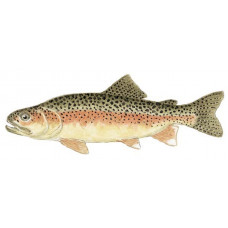Latin name
Oncorhynchus gilae
Other names
No information
Identification
The Gila trout, a member of the Salmonidae family, is an olive to copper-colored fish with small irregular black spots on its upper body, head, dorsal fin, and tail fin. These spots protect the fish from predators. A fuzzy pink stripe runs down each side, as well as a yellow "cutthroat" mark under the lower jaw and white or yellow tips on the dorsal, anal and pelvic fins.
Distribution
Along with the Apache trout, the Gila trout is one of only two native trout in Arizona, both of which are critically endangered. The Gila trout was originally found in tributaries of the Verde River in Arizona and is still found in small numbers in the upper Gila River in New Mexico.
Habitat
The fish prefers clear, cool mountain streams above 7,800 feet and feeds on both aquatic and terrestrial invertebrates.
Size
Gila trout can grow to 18 inches in length.
Life history and Behavior
No information
Food and feeding habits
No information
Reproduction
No information
| Classification | |
| Phylum | Chordata |
| Class | Actinopterygii |
| Squad | Salmoniformes |
| Family | Salmonidae |
| Genus | Oncorhynchus |
| Species | O. gilae |
| Features | |
| Conservation status | Endangered |
| Habitat | Pelagic |
| Life span, years | No information |
| Maximum body weight, kg | No information |
| Maximum length, cm | 55 |
| Sailing speed, m/s | No information |
| Threat to people | Edible |
| Way of eating | Predator |

